In recent years, the demand for eco-friendly takeout containers has skyrocketed as both consumers and businesses become more conscious of the environmental impact of their choices. This has led to the development of a wide variety of biodegradable food containers for takeout that are made from sustainable materials like sugarcane bagasse, natural bagasse, and bamboo fiber.
These compostable options, offered by brands like Ecotainer® and World Centric®, are not only better for the planet but are also highly functional, with features such as leak-proof capabilities, clear lids, and hinged designs that cater to an array of food service needs. This article’ll explore ten great options for biodegradable to-go containers that demonstrate how going green doesn’t mean sacrificing convenience and functionality.
Key Takeaways
- Biodegradable food containers for takeout are growing in popularity as a sustainable alternative to traditional plastic containers.
- Materials such as sugarcane bagasse, natural bagasse, and bamboo fiber are used to create compostable and eco-friendly takeout containers.
- Brands like Ecotainer® and World Centric® offer a variety of environmentally-friendly options, including containers with leak-proof capabilities and clear lids.
- Compostable containers can be used for various food service needs, such as meal prep and catering, without sacrificing convenience and functionality.
- Choosing biodegradable containers for takeout can help reduce waste and promote more sustainable practices within the food service industry.
10 Biodegradable Food Containers for Takeout
Here is a list of 10 biodegradable food containers for takeout, along with some tips and statistics for each:
- Sugarcane fiber containers
- Tip: Sugarcane is a fast-growing and renewable resource that makes sturdy and compostable containers.
- Statistic: In commercial composting facilities, sugarcane fiber containers biodegrade in 90-180 days.
- Bagasse fiber containers
- Tip: Bagasse is the fiber left over after sugarcane is processed to make sugar. Using this waste material reduces waste.
- Statistic: Bagasse containers are microwave and oven-safe up to 220°C.
- Bamboo fiber containers
- Tip: Bamboo is highly renewable and biodegradable. Bamboo packaging has antibacterial properties to keep food fresher longer4.
- Statistic: Bamboo fiber containers biodegrade in 1-5 years in landfills8.
- Palm leaf containers
- Tip: Palm leaves offer a natural way to package takeout food sustainably.
- Statistic: Palm leaf boxes biodegrade back into the soil in just 4-6 months9.
- Wheat straw containers
- Tip: Wheat straw is the stalk left after wheat is harvested. Using this waste material reduces waste.
- Statistic: U.S. wheat farmers produce over 90 million metric tons of wheat straw waste annually that could be used for biodegradable packaging.
- Corn starch containers
- Tip: Corn starch bioplastics are derived from plants instead of fossil fuels.
- Statistic: Corn starch bioplastics can biodegrade in commercial composting facilities in just 45-90 days.
- Paper containers
- Tip: Uncoated paper containers keep takeout food free of plastic and foam.
- Statistic: Paper containers are recyclable through standard paper recycling streams.
- PLA plastic containers
- Tip: PLA plastics are made from renewable plant starches like corn instead of fossil fuels.
- Statistic: PLA plastic can biodegrade in 47-90 days in industrial composting facilities.
- Wood pulp fiber containers
- Tip: Containers made from wood pulp require less energy and fewer greenhouse emissions to produce than plastic.
- Statistic: Molded wood pulp containers are 100% compostable in 90 days.
- Leaf and grass fiber containers
- Tip: Using agricultural crop waste instead of wood helps reduce deforestation impacts.
- Statistic: On average, leaf and grass fiber containers biodegrade in just 40-90 days.
I’ve included a variety of natural fiber and bioplastic containers to give you different eco-friendly options to choose from. Let me know if you need any other details on these items or have additional questions!
The Importance of Eco-Friendly Takeout Containers
As we strive to reduce our ecological footprint, the choice of takeout containers plays a pivotal role in waste reduction and the promotion of sustainability practices. This is why it’s important to understand the distinction between compostable and biodegradable takeout containers and the benefits of switching to eco-friendly options made from renewable, plant-based materials.
Understanding Compostable vs. Biodegradable
While both compostable and biodegradable containers suggest environmental benefits, certified compostable containers meet specific ASTM standards for breaking down in commercial composting facilities.
BioWrap developed Europe’s first 100% bio-compostable stretch film, aiming to replace petrochemical plastics with compostable alternatives to reduce greenhouse gases and waste. This innovation is particularly significant for the food industry and contributes to a more sustainable planet.
On the contrary, many biodegradable options may not efficiently decompose in landfills or backyard composts. Choosing containers certified by entities such as the Biodegradable Products Institute ensures the integrity of sustainability claims.
Benefits of Switching to Eco-Friendly Takeout Containers
Making the switch to eco-friendly takeout containers crafted from materials like bamboo, corn PLA, and sugarcane bagasse can significantly contribute to reducing our ecological footprint. These materials are not only sustainable but also renewable, sourced from plants like wheat straw and bulrush or converted from potato and wood waste. Additionally, eco-friendly container options often provide excellent insulation and leak-proof features that cater to various food types and temperatures.
Role in Waste Reduction and Sustainability
The food service industry plays a critical role in waste reduction and sustainability by adopting eco-friendly takeout containers. When businesses use sustainable options like paper, cardboard, or bamboo containers, they promote the responsible use of resources and reduce the volume of plastic waste that ends up in landfills or our oceans. By offering customers environmentally conscious packaging options, they demonstrate their commitment to preserving the planet and inspire ecological responsibility.
Biodegradable Material Options for Food Containers
With growing environmental awareness, the demand for eco-friendly food containers made from biodegradable materials is on the rise. Several plant-based materials, such as sugarcane bagasse, bamboo fiber, and wheat straw, have been used to create functional and compostable food containers that are kind to the earth. In this article, we will discuss each of these materials and their significance in shaping a more sustainable future.
Sugarcane Bagasse: A Sustainable Choice
Sugarcane bagasse is gaining popularity as a preferred material for eco-friendly disposable food containers. Bagasse is a byproduct of the sugar industry, remaining once the sugar juice has been extracted from sugarcane. As a result, it is a sustainable and renewable source for making compostable food containers. Products made from sugarcane bagasse include takeout boxes, deli containers, and hinged lids, all ensuring a greener option for businesses and consumers alike.
Bamboo Fiber Containers: Renewability at its Best
Bamboo fiber offers another renewable and eco-friendly material option for disposable food containers. Bamboo is known for its rapid growth and minimal impact on the environment, making it a viable alternative to traditional plastic and paper containers. Containers made from bamboo are not only compostable but also lightweight and durable, offering excellent performance for various foodservice applications, such as take out boxes and deli containers.
Wheat Straw Containers: Utilizing Agricultural Byproducts
Wheat straw, an agricultural byproduct, is another fantastic, eco-friendly option for food container production. Converting wheat straw into compostable takeout boxes, hinged lids, and other types of food containers diverts this resource from waste streams and promotes a circular economy. In addition, wheat straw containers are sturdy and reliable, providing firmness and stability for carrying meals while remaining environmentally responsible.
In conclusion, adopting biodegradable materials like sugarcane bagasse, bamboo fiber, and wheat straw in food containers demonstrates a commendable shift towards eco-friendly and sustainable foodservice practices. Making the conscious choice to use these renewable, plant-based materials helps reduce our environmental impact and move towards a greener future.
Biodegradable Food Containers for Takeout
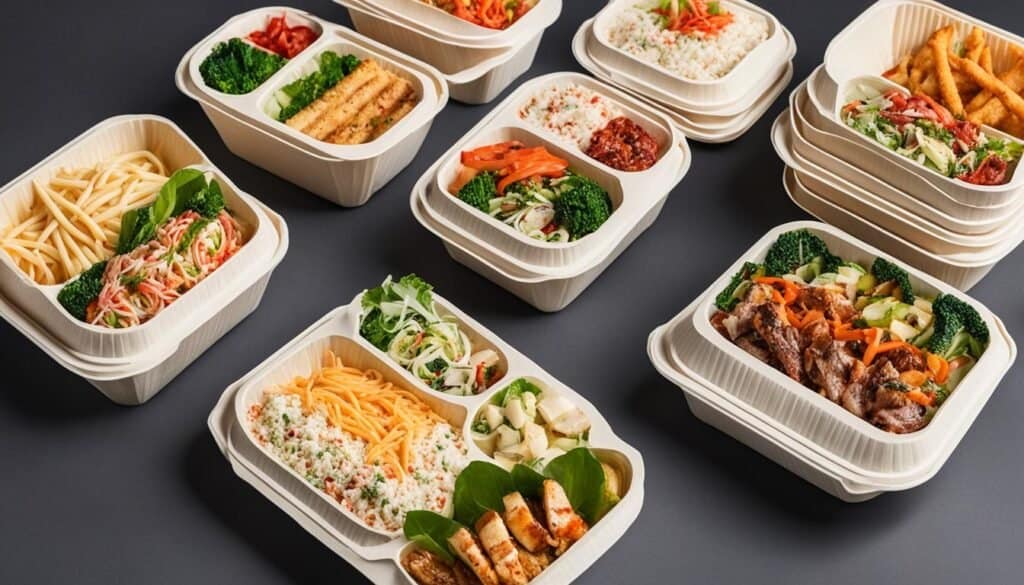
Biodegradable food containers for takeout have rapidly emerged as the preferred choice for those embracing eco-friendly and environmentally friendly practices. Recognizing the importance of conservation and preservation of the environment, these containers minimize the volume of waste in landfills when disposed of correctly. Designed to accommodate a wide range of foods, biodegradable take out food containers offer both functionality and environmental responsibility, catering to the increasing demand for sustainable practices in the food service industry.
Not only do these containers contribute to conservation efforts and preservation of the environment, but they also cater to a variety of needs across foodservice establishments. Whether it’s a piping hot soup or a fresh, crisp salad, biodegradable to-go containers provide a practical solution that aligns with environmental values.
- Eco friendly materials: Made from natural and renewable resources such as sugarcane bagasse, bamboo fibers, and plant starches, these containers are a sustainable alternative to traditional plastic or Styrofoam containers.
- Compostable and biodegradable: When composted correctly, these containers break down into natural elements within a relatively short time frame, reducing landfill waste and greenhouse gas emissions associated with traditional disposable containers.
- Versatility: Environmentally friendly containers are available in various shapes, sizes, and styles to suit a wide range of food types and portion sizes, ensuring they meet evolving consumer expectations.
By adopting biodegradable take out containers in their establishments, food service providers not only make a statement about their dedication to environmentally friendly practices, but they also actively participate in the global effort to reduce waste and promote a more sustainable future.
Compostable Clamshell Take Out Containers
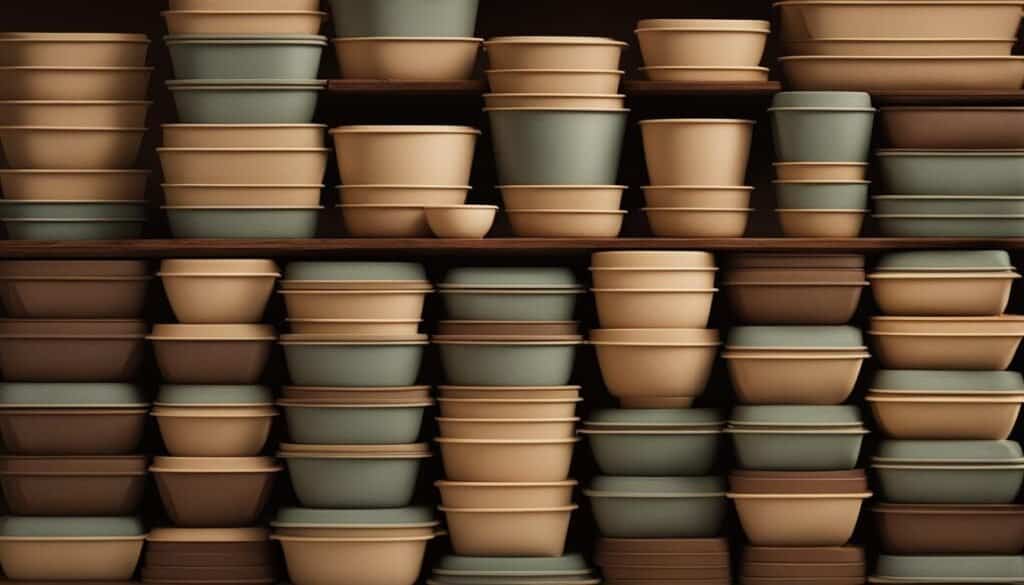
Compostable clamshell take out containers are revolutionizing the foodservice industry by offering convenient and eco-friendly alternatives to traditional plastics. Manufactured from sustainable materials such as natural bagasse and bamboo fiber, these containers cater to consumer preferences while supporting the transition to greener practices.
Materials Used in Compostable Clamshells
Choose from a variety of natural disposable materials to achieve a greener takeaway experience. Bagasse, a byproduct of sugarcane production, and bamboo fiber, which grows rapidly, are two of the most popular materials used for compostable clamshells. In addition, these containers are designed to be recyclable, biodegradable, and compostable, ultimately reducing waste in landfills and contributing to a more sustainable lifestyle.
Advantages of Clamshell Designs for Takeout
The clamshell design boasts several advantages when it comes to eco-friendly takeout. Its convenience and secure closure ensure that food remains protected during transportation, preventing spills and leakage. Known for its functionality and versatility, the compostable clamshell is a reliable choice for a wide range of food items. By offering a sustainable and user-friendly experience, these containers continue to gain popularity among environmentally conscious consumers and foodservice businesses.
Eco-Friendly Solutions for Hot Food Takeout
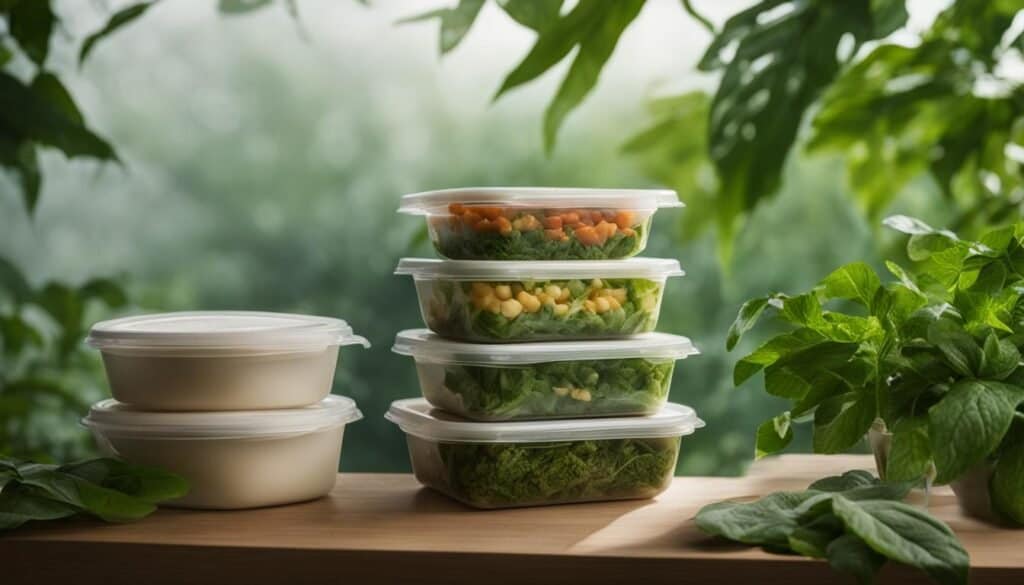
When it comes to serving hot foods like soups, stews, and chilis, environmentally conscious businesses in the food service industry must choose containers that ensure heat retention while maintaining the quality of the meal during transportation. Fortunately, there are a variety of eco-friendly food container options tailored to meet these specific needs, offering both practical advantages and environmental benefits.
Special Compostable Designs for Heat Retention
Compostable hot food containers are designed with features that cater to the unique requirements of serving hot meals for takeout or delivery. These containers are crafted from sustainable resources such as wood fiber, sugarcane, and bamboo, providing durability and insulation to retain heat. Additionally, they are tested and certified to withstand high temperatures, allowing them to safely hold hot foods without melting or leaking.
Choosing Containers for Soups, Stews, and Chilis
When selecting the right containers for hot takeout meals, it’s essential to consider factors such as size, shape, and material. Some popular eco-friendly options include:
- Wood fiber containers: With their sturdy composition and natural insulation properties, wood fiber containers are ideal for hot foods like soups and stews.
- Sugarcane (bagasse) containers: Derived from a natural byproduct of the sugar industry, bagasse containers offer a lightweight, yet durable solution for transporting hot meals.
- Bamboo containers: Fast-growing and sustainable, bamboo is an excellent material for containers designed to hold hot, to-go meals.
Reputable brands such as Biodegradable Products Institute (BPI) and CMA® offer a range of compostable food containers that meet ASTM 6400/6868 standards for compostability, ensuring conscientious businesses have access to eco-friendly solutions that also satisfy the practical aspects of food service.
Advancements in Leak-Proof and Insulated Designs
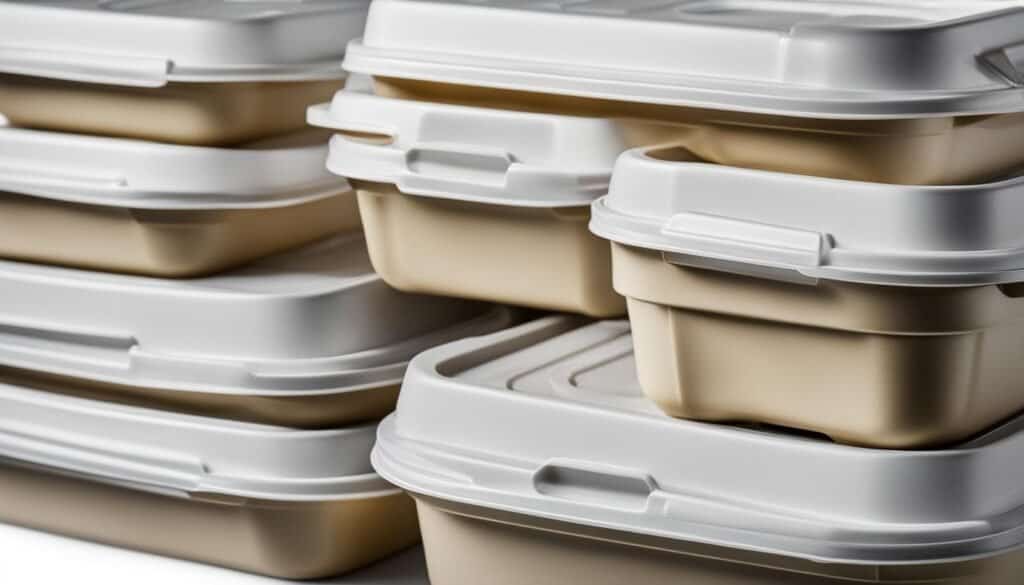
As the demand for eco-friendly biodegradable food containers continues to grow, designers have risen to the occasion by incorporating innovative features that cater to the needs of both food providers and consumers. Some notable advancements include leak-proof options and insulated designs for hot food containers, blending functionality with sustainability.
Leak-Proof Features for Liquid Foods
One of the most crucial aspects of takeout containers is their ability to hold liquid foods securely without leaking. Biodegradable containers have significantly improved in this area, introducing leak-proof designs while maintaining their compostable nature. These containers make it easy to transport soups, stews, and other liquid foods without any mess, ensuring a seamless takeout experience.
Innovative Insulation for Keeping Meals Hot
Keeping meals hot during transportation is another vital aspect of takeout services. Insulated designs in disposable takeout containers have come a long way, focusing on heat retention to ensure meals stay hot for longer. Many eco-friendly, compostable hot food containers with advanced insulation features are now available in the market, allowing meal prep services and customers to enjoy hot meals without compromising on sustainability.
In conclusion, these leak-proof and insulated design advancements have made it easier for consumers to embrace eco-friendly alternatives and have bridged the gap between functionality and sustainability, allowing providers and consumers to enjoy a more responsible takeout experience.
Customizable and Branded Eco-Friendly Containers
Eco-conscious businesses in the foodservice industry can substantially benefit from customizable food containers crafted from biodegradable and recyclable materials. These branded containers showcase a company’s commitment to environmental conservation while promoting its brand and products. With the ability to tailor containers to feature logos or personalized messaging, these eco-friendly options meet the dual purpose of marketing and environmental responsibility.
Companies in the takeaway and food service sectors that harness the power of go packaging set themselves apart as industry innovators by prioritizing sustainability. By adopting these environmentally friendly solutions, businesses send a clear message to their customers and competitors, emphasizing the importance of environmental conservation alongside exceptional service delivery.
Incorporating customizable and branded eco-friendly containers into foodservice solutions not only serves as effective marketing tools but also emphasizes a company’s environmental responsibility.
Several companies offer branding services for eco-friendly containers, providing a variety of customization options. Here are some popular types of eco-friendly containers commonly used for customization:
- Sugarcane bagasse boxes
- Bamboo fiber containers
- Wheat straw clamshells
- PLA-lined kraft paper containers
In conclusion, customizable and branded eco-friendly containers provide businesses in the food service sector a unique opportunity to showcase their commitment to environmental conservation while simultaneously promoting their brand. Adopting these eco-responsible packaging solutions helps raise awareness and set the stage for a shift toward more sustainable business practices in the industry.
Compostable Food Containers with Clear Lids
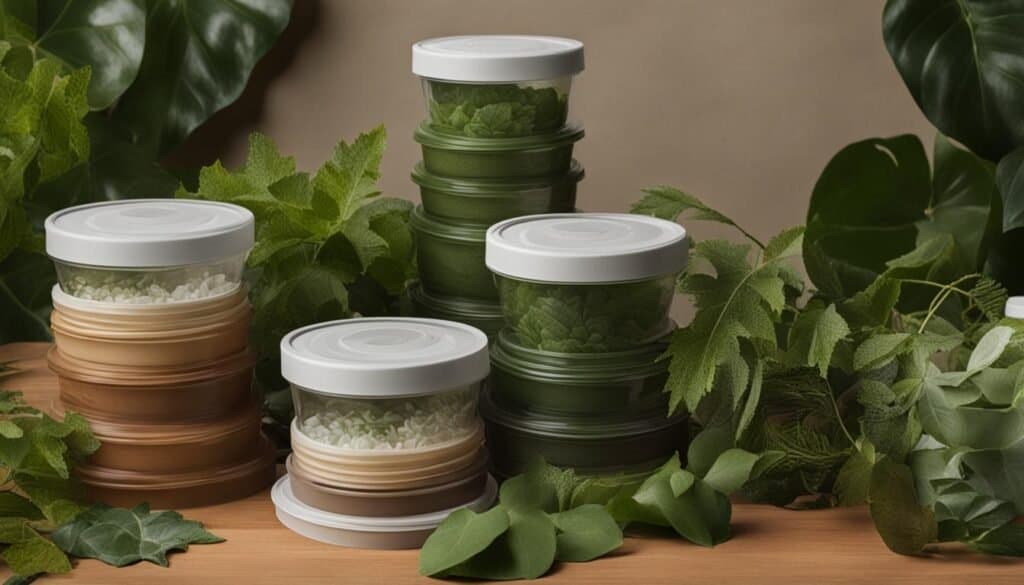
Compostable food containers with clear lids are gaining popularity as they combine functionality and aesthetics, improving overall food presentation. These eco-friendly takeout containers have transparent lids that showcase the food contents while being crafted from sustainable materials. Let’s explore the benefits of clear lids and the compostable materials used to make them.
Transparent Lids for Attractive Food Presentation
Transparent, clear lids play a crucial role in enhancing food presentation, giving customers a sneak peek of the delicious treat they are about to enjoy. By using containers with lids that are see-through, foodservice providers can showcase their culinary creations in an appealing manner, inviting diners to indulge in the visual treat before savoring the flavors.
Compostable Materials Used in Lids
Compostable food containers are often made from eco-friendly materials such as corn PLA. Corn PLA is a renewable resource that offers biodegradability and compostability, making it a responsible choice in the movement towards a sustainable food service industry. When combined with the transparent design, these compostable to go containers deliver an attractive and eco-friendly solution for both businesses and their customers.
| Compostable Material | Features |
|---|---|
| Corn PLA | Eco-friendly, biodegradable, and compostable |
| Bagasse | Made from sugarcane fibers, and compostable |
| Wheat Straw | Utilizes agricultural byproducts, and compostable |
By choosing compostable food containers with clear lids, businesses can showcase their commitment to both exquisite food presentation and eco-friendly practices. This translates to a positive experience for customers and an environmentally responsible approach for the food service industry.
Heavy-Duty Options for Catering and Meal Prep
With the growing demand for sustainable and eco-friendly solutions in the foodservice industry, heavy-duty biodegradable containers have emerged as an optimal choice for catering and meal prep enterprises. These containers are designed to handle large portions and withstand the challenges of transportation without compromising on biodegradability or quality. In this section, we will explore the different types of durable biodegradable containers available for large-scale use and discuss how to find the perfect fit for your food service needs.
Durable Biodegradable Containers for Large Portions
Whether you’re in the catering business or providing meal prep services, it’s essential to select containers that are both durable and eco-friendly. There are a variety of options available, such as compostable takeout containers made from bagasse or bamboo fibers. Additionally, recyclable options include large take containers crafted from post-consumer recycled materials, which further support sustainability efforts.
It’s worth noting that these heavy-duty containers come in various shapes and sizes, making them suitable for a range of food types and portions. They also feature secure closures, ensuring that meals remain fresh and appetizing during transportation.
Finding the Right Fit for Food Service Needs
Choosing the ideal biodegradable containers for catering and meal prep services can be daunting. Here are some factors to consider when making your selection:
- Biodegradability or Compostability: Look for products that are certified as either biodegradable or compostable, showcasing their eco-friendliness and their potential for breaking down in an environmentally responsible manner.
- Strength and Durability: Ensure that the containers are sturdy enough to withstand the demands of transportation without losing their shape or failing to secure the contents within.
- Size and Capacity: Assess the size and capacity of the containers to ensure they can accommodate large portions and various food types that your catering or meal prep business offers.
- Functionality: Consider whether the containers need to be microwave-safe, leak-proof, or insulated, depending on the nature of the meals you provide and the preferences of your customers.
- Customization: Does your business require customization options, such as branding the container with your logo or message to create a more cohesive presentation?
By carefully evaluating these factors and understanding your food service requirements, you can make an informed decision about the types of containers best suited for your catering or meal prep business. Ultimately, opting for heavy-duty biodegradable and recyclable containers not only provides effective and sustainable food storage for your customers but also supports the global effort towards reducing waste and promoting eco-friendly practices in the foodservice industry.
Conclusion on Biodegradable Food Containers for Takeout
Embracing sustainability in the food service industry is a necessary step towards preserving our environment and reducing waste. By choosing biodegradable containers, both companies and individuals can make a positive impact on our planet. In this section, we will discuss the importance of adopting sustainable practices, selecting the right type of container for your needs, and encouraging others to follow suit.
Embracing Sustainability in the Food Service Industry
Adopting eco-friendly and sustainable practices in the food service industry is essential for ensuring the future of our environment and ecology. Biodegradable and compostable containers help minimize waste and reduce our ecological footprint. By opting for these environmentally-friendly alternatives, food service companies can play a direct role in conservation and preservation efforts, contributing to the overall well-being of our planet.
Choosing the Right Biodegradable Container for Your Needs
When selecting a biodegradable container, it’s essential to consider both the functionality and environmental impact of the product. Factors such as heat retention, durability, and leak-proof designs should be taken into account, as well as the materials used, like sugarcane bagasse, bamboo fiber, and wheat straw. By finding the right fit for your specific food service needs, you can ensure effective and sustainable solutions for takeout and catering operations.
Encouraging the Adoption of Environmentally Friendly Practices
Ultimately, the success of sustainability initiatives within the food service industry relies on widespread adoption of eco-friendly practices. Encouraging businesses and individuals to choose biodegradable containers and prioritize waste reduction is crucial for fostering a more sustainable future. When combined with ongoing conservation and preservation efforts, these actions can help protect our environment, ecology, and natural resources for generations to come.
FAQ on Take Out Box Alternatives
Q: What are the features of eco-friendly biodegradable food containers for takeout or to-go boxes?
A: Eco-friendly biodegradable food containers or to-go boxes are made with sustainable materials, often composed of kraft paper or natural bagasse, a by-product of sugar cane. They are disposable, compostable and often feature a clamshell hinged lid.
Q: Where can I buy biodegradable food containers and takeout boxes at wholesale prices?
A: There are many online retailers and manufacturers that sell biodegradable food containers and takeout boxes at wholesale prices. You can find eco-friendly options in various sizes (like 24oz or 8 oz kraft containers) and designs, such as 3-compartment lunch boxes or soup containers.
Q: Are all biodegradable take-out containers microwave safe?
A: While many biodegradable take-out containers are microwavable, it’s always best to check the manufacturer’s specifications. Kraft paper and bagasse containers often withstand certain levels of heat, making them safe for some microwave uses.
Q: Are biodegradable to-go boxes available in different compartments?
A: Yes, biodegradable to-go boxes are available in various structures including single compartment and multiple compartments like 3-compartment containers, making them versatile for different food types.
Q: What type of lids are provided with these biodegradable takeout containers?
A: Many biodegradable takeout containers come with clamshell hinged lids to securely close the container. Some may also offer separate lids as part of the package.
Q: Are biodegradable food containers safe to use for food storage?
A: Yes, biodegradable food containers are designed to be safe for food storage. They are typically free of chemicals such as PFAS, offering a healthier choice for storing and serving food.
Q: Can biodegradable take-out boxes be used for both hot and cold dishes?
A: Yes, most biodegradable take-out boxes have the ability to hold both hot and cold dishes. Kraft paper and bagasse are sturdy materials that resist moisture, making them suitable for a variety of food types and temperatures.
Q: Are there eco-friendly options for clamshell take out food containers?
A: Absolutely. There are many eco-friendly options for clamshell take out food containers. These are commonly made of compostable materials like bagasse or kraft paper, providing the convenience of disposable packaging without the environmental impact.
Q: Can you compost biodegradable to-go containers?
A: Yes, many biodegradable to-go containers are designed to be compostable, meaning they can break down naturally in a composting environment. Compostable disposable containers are an excellent option for eco-conscious consumers and businesses.
Q: Are there any biodegradable options for soup take-out containers?
A: Yes, there are biodegradable soup take-out containers available. These are often made from materials such as kraft paper or bagasse, which are able to withstand the heat of hot liquids while remaining eco-friendly.

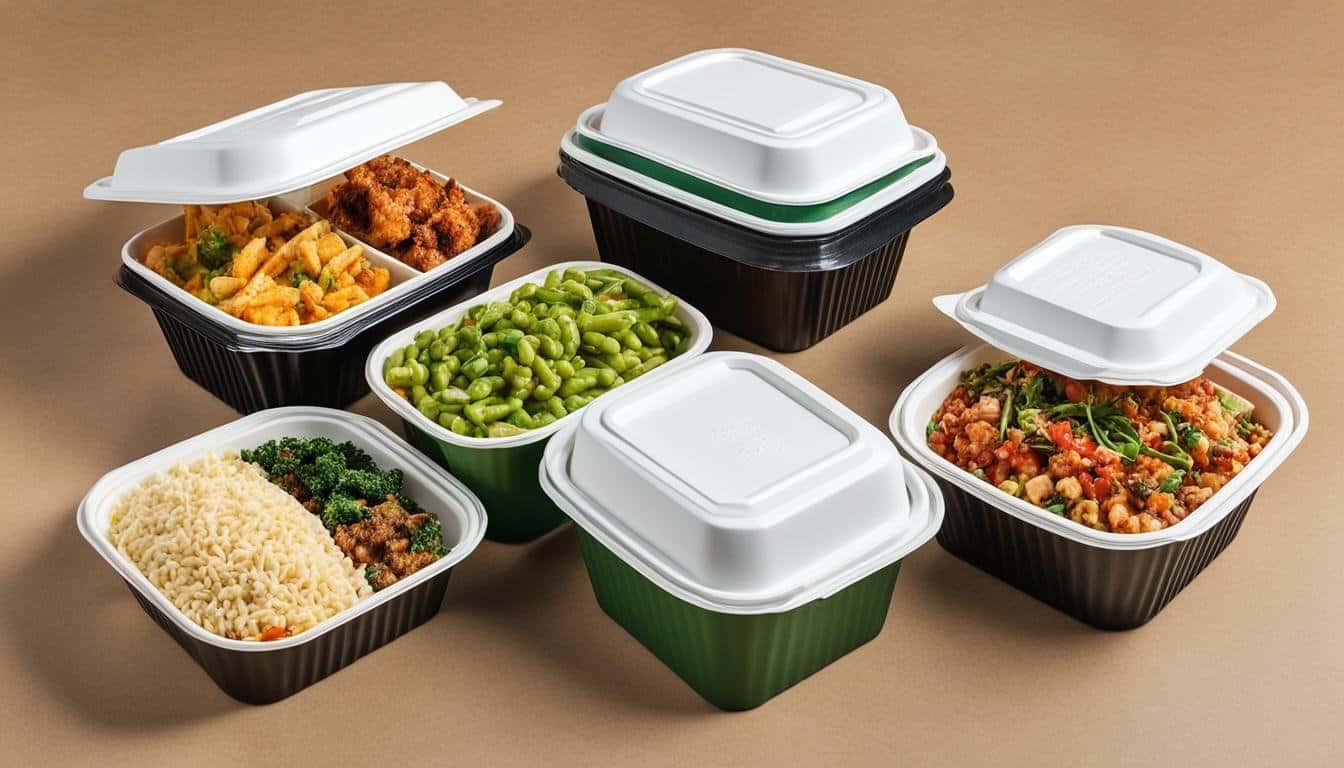


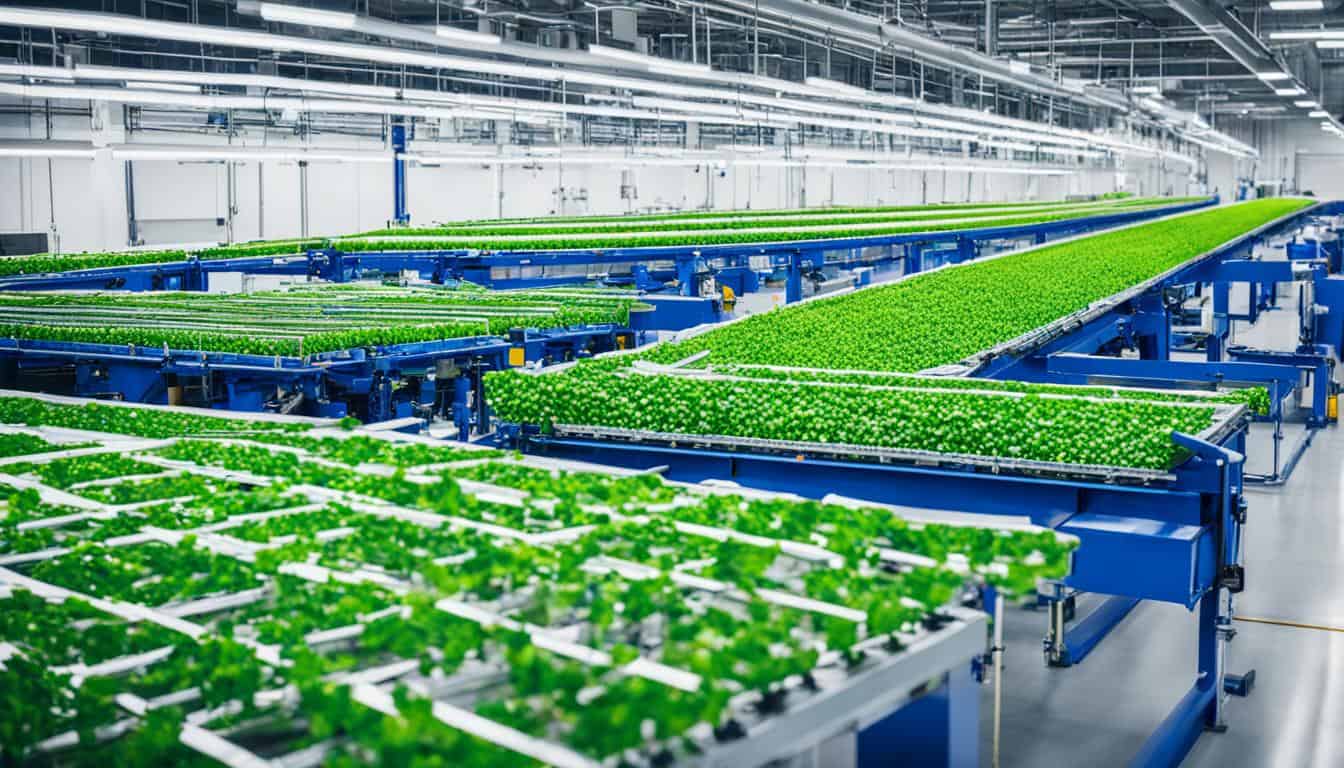
Leave a Reply